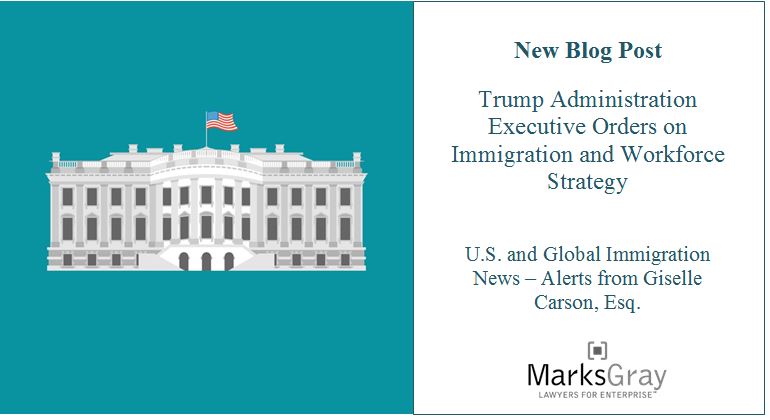
As of this writing, the Trump Administration has issued and is expected to continue to issue Executive Orders (EO) relating to immigration including visa issuance, screening procedures, E-Verify, higher H-1B wages and refugees.
The intent of these EO is to protect our nation but they are also having the effect of creating confusion, anxiety and delays for foreign nationals and their employers.
Some of the EOs will curtail employment-based legal immigration. But, this approach goes against the required workforce strategy to allow the U.S. to compete in a global economy.
As I help business immigration clients hire and retain foreign talent, I hear them say “I can’t find enough of the right talent.” They spend much of their time recruiting talent they need today – and almost no time recruiting for the future.
US companies need foreign talent to remain globally competitive. With unemployment at under 5%, over 5.6 million job openings in the U.S. and an aging workforce which is not being replaced by U.S. born talent, there aren’t enough skilled workers to grow our economy.
US employers’ growth plans must include a global strategy that includes employment-based legal immigration. This takes planning, supportive laws and EOs, and help from experienced immigration attorneys who can help employers navigate processes that nurture global talent. Plan to start small and we’re here to help you grow.
This process also involves staying educated on the upcoming changes and EOs and how to best approach them.
The EOs signed and/or in process include the following:
- Direct DHS to identify ways to expand the use of E-Verify.
- Review and terminate parole programs.
- Consider the allocation of H-1B visas.
- Expanding the employer site visits program.
- Suspend the Visa Interview Waiver Program requiring all visa applicants to attend an in-person interview unless exempt by statute.
- Suspend refugee admissions for at least four months, with some exceptions.
- Temporarily suspend the entry of immigrants and nonimmigrants from primarily Muslim countries.
- Add requirements to screenings and procedures for all immigration benefits to identify fraud and detect intent to do harm.
- Expedite completion of the biometric entry-exit system.
What is our advice to clients at this time?
Remain calm and informed and plan accordingly. As these EOs are implemented, foreign nationals and employers should plan for delays on visa issuance for people coming to the U.S., delays in USCIS processing, crowding of secondary inspection sites at ports of entry and increased documentary requirements.
The EOs have already come under legal review. Federal judges in at least four courts have issued rulings blocking the implementation of portions of some of these EOs.
If you are from an affected country, plan to suspend all international travel temporarily. There are very limited exceptions to the EO on travel. The EO exempts from this order affected nationals traveling on diplomatic visas, North Atlantic Treaty Organization visas, C-2 transit visas and certain G visas (international organizations). The vast majority of those traveling on non-immigrant visas (e.g. F-1, H-1B, O-1, P-1 and others) are not excluded from the EO.
The DHS has clarified that “green card” holders will be admitted on a case-by-case determination.
The situation remains fluid, the EOs are being applied inconsistently, and legal challenges are occurring rapidly. We will continue to follow this situation and will provide relevant updates.
